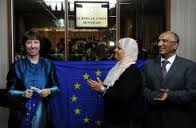
 Foreign diplomats are in Benghazi, the opposition stronghold, lending further support to the idea that Gaddafi is not going to win this one.
Foreign diplomats are in Benghazi, the opposition stronghold, lending further support to the idea that Gaddafi is not going to win this one.
Sunday: European Union
On Sunday, the European Union opened a diplomatic office in Benghazi. The EU’s top diplomat, Catherine Ashton, led the ceremonies in Benghazi’s heavily guarded Tibesti Hotel pledging support for a democratic Libya free of Gadhafi. The office provides a link between the rebels and the 27-nation bloc adding to the rebels’ increasing international recognition. France and Italy already officially recognize the rebels, while the United States is in the midst of diplomatic talks with the Libyan opposition.
Monday: United States
On Monday, Assistant Secretary of State for Near Eastern Affairs Jeffrey Feltman was in the rebel stronghold Benghazi for talks with leaders of the government opposition. He is the most senior U.S. diplomat to visit Libya since the uprising against leader Moammar Gadhafi began in February. The U.S. Department of State published this official statement:
Assistant Secretary for Near Eastern Affairs Jeffrey Feltman is traveling to Benghazi, Libya May 22-24 to meet with Transitional National Council (TNC) members, including Chairman Mustafa Abdul Jalil. Coming on the heels of TNC Executive Bureau President Mahmoud Jibril’s May 10-13 visit to Washington, Assistant Secretary Feltman’s visit to Benghazi is another signal of U.S. support for the TNC as a credible and legitimate interlocutor for the Libyan people. The United States remains committed to protecting Libyan civilians and believes Qadhafi must leave power and Libya. The Libyan people, like people everywhere, have the right to determine their own future and the United States will continue to support them and to work with the TNC in this endeavor.
May 19: President Obama
While the U.S. has not yet officially recognised the Libyan opposition as the legitimate government as has France and Italy, President Obama’s latest remarks of May 19 show that such recognition is not far off.
Unfortunately, in too many countries, calls for change have been answered by violence. The most extreme example is Libya, where Moammar Gaddafi launched a war against his people, promising to hunt them down like rats. As I said when the United States joined an international coalition to intervene, we cannot prevent every injustice perpetrated by a regime against its people, and we have learned from our experience in Iraq just how costly and difficult it is to impose regime change by force – no matter how well-intended it may be.
But in Libya, we saw the prospect of imminent massacre, had a mandate for action, and heard the Libyan people’s call for help. Had we not acted along with our NATO allies and regional coalition partners, thousands would have been killed. The message would have been clear: keep power by killing as many people as it takes. Now, time is working against Gaddafi. He does not have control over his country. The opposition has organized a legitimate and credible Interim Council. And when Gaddafi inevitably leaves or is forced from power, decades of provocation will come to an end, and the transition to a democratic Libya can proceed.
Friday, May 20
Eight warships belonging to Gadaffi’s forces were sunk by NATO bombing runs. Co-ordinated overnight attacks struck the ports of Tripoli, Al Khums and Sirte.
Thursday, May 19
An oil tanker, the Malta-flagged Jupiter, with a capacity to carry between 10,000-15,000 tons of gasoline, was intercepted by the NATO alliance and forcibly diverted from docking in Libya. It is thought that the ship would be delivering fuel to military forces headed by Libyan leader Muammar Gaddafi. While international sanctions do not include a fuel embargo, a NATO spokesperson was quoted as saying, “NATO naval forces can deny access to vessels entering or leaving Libyan ports if there is reliable information to suggest that the vessel or its cargo will be used to support attacks or threats on civilians, either directly or indirectly.” This action could be part of an up-coming initiative by the European Union to tighten sanctions on Gaddafi by blacklisting ports to prevent exports of oil and imports of fuel.
EUXTV – May 23/2011
EU Foreign Affairs chief Ashton opens EU office in Benghazi
The European Union has opened an office in the Libyan city of Benghazi in order to help it carry out its role in the re-development of Libya. Catherine Ashton the EU’s top foreign Affairs head was in Benghazi this week and responded to a number of questions on the future of the European Union’s role in the country, a country which still has Col. Gaddafi as its leader, despite the coalition backed rebels being in control of much of the country. Benghazi, the centre of rebel power, is an important symbolic town in the conflict, as it was the treats to the civilian population there, that sparked EU military intervention.
Al Jazeera – May 21/2011
Fighting continues on Libya-Tunisia border
NATO has stepped up its bombing campaign in Libya with air raids on Tripoli and a residence of Libyan leader Muammar Gaddafi. In the west of the country, pro and anti Gaddafi forces are battling for control of a border crossing between Libya and Tunisia.
References
Wikipedia: 2011 Libyan civil war
http://en.wikipedia.org/wiki/2011_Libyan_civil_war
The 2011 Libyan civil war is an ongoing armed conflict in the North African state of Libya being fought between those seeking to depose the country’s de facto ruler and dictator Muammar Gaddafi and hold democratic elections, and pro-Gaddafi forces.
Wikipedia: 2011 military intervention in Libya
http://en.wikipedia.org/wiki/Libyan_no-fly_zone
On 19 March 2011 a multi-state coalition began a military intervention in Libya to implement United Nations Security Council Resolution 1973, which was taken in response to events during the 2011 Libyan civil war.
Click HERE to read more from William Belle
Article viewed at: Oye! Times at www.oyetimes.com

Be the first to comment